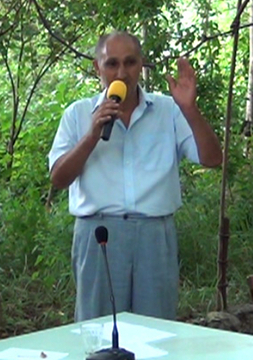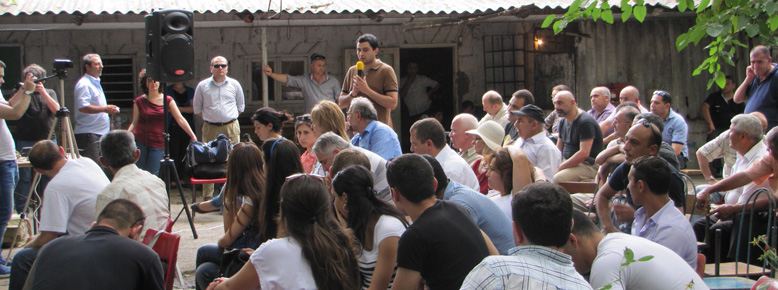
VIOLATIONS OF CEASE-FIRE:
IS PUBLIC INTERVENTION
A REALISTIC IDEA?
The minutes of the public hearing that took place on 16 June 2012 in the village of Tekali, at the intersection
of the borders of the three South-Caucasian republics, with the participation of the dwellers of Akstafa, Baku, Ganja, Gyumri, Ijevan, Marneuli, Noemberyan, Qazakh, Tbilisi, Tovuz, Yerevan and the frontier villages of Armenia, Azerbaijan and Georgia.
Organizers of the hearing:
Teqali Association, Georgia
Center of Regional Partnership and Community Development, Azerbaijan
Caucasus Center of Peace-Making Initiatives, Armenia
Moderator: Michael Mirziashvili
Photo: Onik Krikorian, Galina Petriashvili, Irakli Chikhladze, Alexander Avsajanishvili, Marion Kipiani, CCPMI
The hearing passed in framework of Mock Court for Human Rights project by support of National Endowment for Democracy (USA)
Organizers of the hearing:
Teqali Association, Georgia
Center of Regional Partnership and Community Development, Azerbaijan
Caucasus Center of Peace-Making Initiatives, Armenia
Moderator: Michael Mirziashvili
Photo: Onik Krikorian, Galina Petriashvili, Irakli Chikhladze, Alexander Avsajanishvili, Marion Kipiani, CCPMI
The hearing passed in framework of Mock Court for Human Rights project by support of National Endowment for Democracy (USA)
ROUND ONE: THE INTRODUCTION INTO THE SUBJECT MATTER
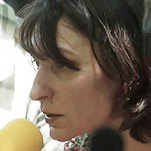
Louisa Poghosyan: In order to answer the question whether society could influence the situation on the demarcation line, I think we need to look into and rethink our ideas of “violations of cease-fire”. We often sin by appealing to “History”, appealing dogmatically to the short, one-page document that was signed 18 years ago. We somehow proceed from the document that was meant to be the first but not the final one, a kind of draft or starting version of a peace agreement. But it turned out quite different, and today’s debates about sticking to or violating the very same agreement proceed from taking a dead letter for reality. Therefore I propose you to view what we call “violations of cease-fire” in a different light: wouldn’t it be more logical to take courage and consider every frontier incident an act of terrorism? Personally I cannot see any sense in shooting at civilians or even at the military. The death of man brings no tactical advantage to either of the sides. This is the policy of terrorist groups, where every action has its own political sense: by doing such things, the Armenian or Azeri side reasserts its political principles and at the same time brings pressure upon its own society, spreads fear of new war or initiates a surge of patriotism. Whatever you call it, it affects our society as a whole, almost every aspect of social life; let alone the certain messages such actions send to international community.
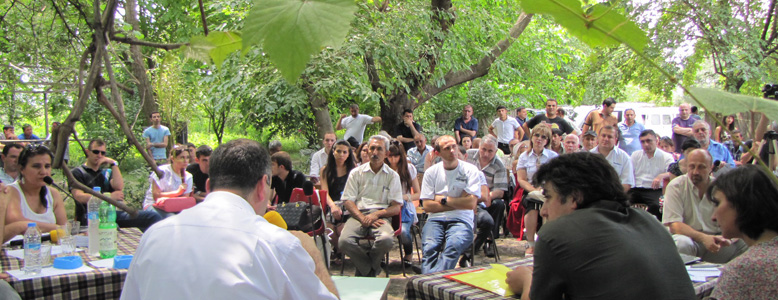
Nowadays, our public institutions just advertise the terrorist component of those incidents. To size up the situation, we must realize that many things have changed both in the conflict and in society for more than 20 years, and the question of potential civil influence turns into the question: is there any society? In the current situation, both human rights activists and political figures, even the best of them, believe that they have to mind their own business: to restrain authorities or to struggle for power, but not intrude into the thick of the conflict and find themselves in the epicenter of political tittle-tattles – it’s impossible, it might spoil their cause.
However, living under the conditions of ever-recurring mutual acts of terrorism, which may seem not so dangerous and lose their topicality after few days, is fraught with very grave consequences. I think the accumulation of fright, the permanent presentiment, can hardly be believed salubrious for our society. It may leave to the total disappearance of the very society. [I think] a reaction of society to something that threatens its very existence is a possible and natural thing. That’s why I answer the question of our hearing: yes, it’s possible. But only if something new appears in the whole South Caucasus – new formats and new approaches.
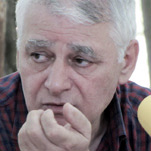
Ali Abasov: I am glad to welcome all the participants of our meeting. I think we all realize its importance, its correlation with our interests. Thank you, Louisa, for your thorough account of the current situation. My first question is: have our republics’ civil societies done anything to prevent such incidents? I am sorry the answer is no. They haven’t done anything. What is more, they seem to be alienated from the problem. Even the mediators believe that there is no room for civil society in conflict negotiations or the conflict resolution process. It isn’t so: civil society may and must pronounce its opinion at crucial moments. As to the problem itself, I think it is mainly humanitarian. I mean, all those exchanges of firing and killings are a form of the capital punishment or homicide, forbidden as such by so many documents adopted by mankind – declarations and laws on crimes against humanity. That’s what it is, and I agree with Louisa: there is no logic in this shooting.
What could we hold up as an example? You know there has been an international movement for nonproliferation of antipersonnel mines. The movement has managed to bring about the ban; it has won a Nobel Prize for it struggle against the arm that has maimed not only the military but also civilians. We have a similar problem now: not only the military suffer, it often happens to quite peaceful people and, what is more, to children, which is absolutely inadmissible. Therefore, proceeding from Louisa’s idea, I say we certainly need an organization. It should be an international organization. I mean we may enlist some respected people, whose ideas carry weight in international practice – human rights activists, public figures and perhaps even members of some State structures, e. g. those dealing with the mine clearing etc. In my opinion, the organization must make a declaration on both humanitarian and legal aspects of the problem. I mean we need legal definitions, and, if we adopt this decision, we’ll need lawyers. We’ll have to formulate a concrete declaration based on both international law and generally acceptable humanitarian principles.
It must be a real work. Our events do not often go beyond assembling and having a good time; and when we assemble in another place, the things are right where they started. The problem can be seen as follows: it is not some people of no importance, who are fired upon: it is ourselves; they may kill us, they may kill our child, they may kill one of our kinsfolk. Thus it is a vital problem. It is a question of direct importance for the human aspect of our being, and, considering what was said and what is going to be said here, I think it would be a good job provided we engage in it seriously, even if our civil society is silent before such vandalism and barbarity. I also think that such an organization would enable us to solve other critical problems in the future. As to the form of our cooperation, our mutual confidence is already developed enough to take shape and form. I wonder whether there are people here who see some logic in those shootings and skirmishes. If so, I’d like to listen to their reasons as they are, for I cannot see any.
What could we hold up as an example? You know there has been an international movement for nonproliferation of antipersonnel mines. The movement has managed to bring about the ban; it has won a Nobel Prize for it struggle against the arm that has maimed not only the military but also civilians. We have a similar problem now: not only the military suffer, it often happens to quite peaceful people and, what is more, to children, which is absolutely inadmissible. Therefore, proceeding from Louisa’s idea, I say we certainly need an organization. It should be an international organization. I mean we may enlist some respected people, whose ideas carry weight in international practice – human rights activists, public figures and perhaps even members of some State structures, e. g. those dealing with the mine clearing etc. In my opinion, the organization must make a declaration on both humanitarian and legal aspects of the problem. I mean we need legal definitions, and, if we adopt this decision, we’ll need lawyers. We’ll have to formulate a concrete declaration based on both international law and generally acceptable humanitarian principles.
It must be a real work. Our events do not often go beyond assembling and having a good time; and when we assemble in another place, the things are right where they started. The problem can be seen as follows: it is not some people of no importance, who are fired upon: it is ourselves; they may kill us, they may kill our child, they may kill one of our kinsfolk. Thus it is a vital problem. It is a question of direct importance for the human aspect of our being, and, considering what was said and what is going to be said here, I think it would be a good job provided we engage in it seriously, even if our civil society is silent before such vandalism and barbarity. I also think that such an organization would enable us to solve other critical problems in the future. As to the form of our cooperation, our mutual confidence is already developed enough to take shape and form. I wonder whether there are people here who see some logic in those shootings and skirmishes. If so, I’d like to listen to their reasons as they are, for I cannot see any.
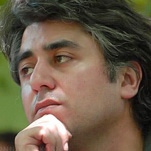
Yury Manvelyan: Speaking about the public intervention, I’d like to speak about the meaning of the terms: what is intervention and what is a truce? We must realize that on the both sides of the border, on the frontline, there are but the lads, who weren’t able to slip out from army or to pay for being assigned to rear services. And those, who give the orders, don’t care in the least if they are killed or crippled. No doubt, those are clearly political decisions: it has already been said here that no tactical or strategic problems are solved with those poor soldiers’ death. And when we say interfering, we mean impeding the policies pursued in the region; then we should be aware of who we hinder from their policy, who we deal with.
The authorities of the conflict parties have ever been doing everything just to minimize or exclude any interference of any considerable number of people living here into any decision-making. They have surrounded themselves not only with force structures, but, what is more dangerous and more horrible, also with the circle of experts, peacemakers, human rights defenders and journalists – I mean so-called ones. The people trying to influence decisions will be beaten not only straight by officers but also by those, who pretend to be our colleagues, journalists. Those structures secure functioning and reproduction of authorities. And what are authorities in our countries? They, first of all, must be chief capitalists, the heads of clans dealing with very big businesses. The appeals to slur over internal problems in order to stand against external threats are in everyday use. But our authorities are not interested in launching large-scale hostilities. They just balance on the verge of war, with sporadic diversions and sorties, for a full-scale war would lead them to the loss of power: anyway, new figures would appear. First, when armed, the people, whose life under the pressure leaves much to be desired, might conceive the desire for solving their problems by themselves. Second, would our rulers be effective managers in case of war? Just look at those, who import limousines, half a million dollars each, and live like Arabian sheikhs: could such people be effective managers in case of war? Anyway, a large-scale war would be dangerous to their power. That’s why they try to benefit somehow from balancing on the verge, keeping people in awe of war but not starting the very war.
The authorities of the conflict parties have ever been doing everything just to minimize or exclude any interference of any considerable number of people living here into any decision-making. They have surrounded themselves not only with force structures, but, what is more dangerous and more horrible, also with the circle of experts, peacemakers, human rights defenders and journalists – I mean so-called ones. The people trying to influence decisions will be beaten not only straight by officers but also by those, who pretend to be our colleagues, journalists. Those structures secure functioning and reproduction of authorities. And what are authorities in our countries? They, first of all, must be chief capitalists, the heads of clans dealing with very big businesses. The appeals to slur over internal problems in order to stand against external threats are in everyday use. But our authorities are not interested in launching large-scale hostilities. They just balance on the verge of war, with sporadic diversions and sorties, for a full-scale war would lead them to the loss of power: anyway, new figures would appear. First, when armed, the people, whose life under the pressure leaves much to be desired, might conceive the desire for solving their problems by themselves. Second, would our rulers be effective managers in case of war? Just look at those, who import limousines, half a million dollars each, and live like Arabian sheikhs: could such people be effective managers in case of war? Anyway, a large-scale war would be dangerous to their power. That’s why they try to benefit somehow from balancing on the verge, keeping people in awe of war but not starting the very war.
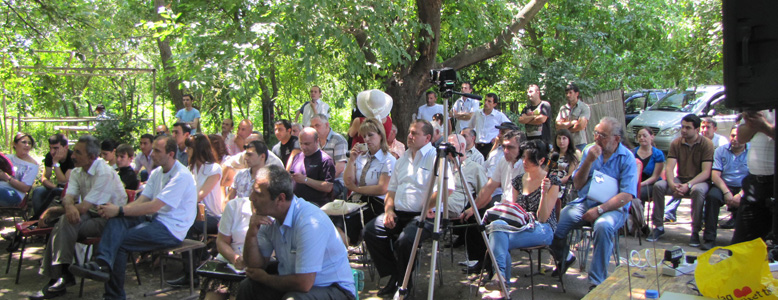
What, from the point of view of our leadership, is civil society or public intervention? First of all, it is a threat to the big business inosculated with power. It is the very raison d'etre of the institutionalized justification of violence against far-outers, those who ask questions, put questions, raise questions, find inconsistencies… What else is the intervention? It is a field or a space for action. One may speculate about the effectiveness or ineffectiveness of our intervention just as one may cogitate whether the Soviet Union would have collapsed if the oil prices hadn’t slumped. Maybe it wouldn’t. Then what sense had the activities of, say, Academician Sakharov or other people who didn’t accept the Soviet government as such? They might just have waited till the oil price dropped, and everything would have changed by itself. But my answer is: yes, it has sense because it is a question of air to breathe, of a space that we are creating for one another and for other people, who need such a space. A space for asking questions, a lot of various questions. Why do shootings happen on the eve of elections? Why do the heads of our countries meet each other in Russia just to sign something or to agree upon the exchange of PWs? Is a summit meeting absolutely necessary for that? Is it normal practice? How could we come to that? Why must our leaders meet in the presence of a third party to exchange PWs? Why doesn’t a 5-hour-long closed meeting trigger any questions? Why can parliamentary delegations or members of political parties go from Armenia to Baku and vice versa, but ordinary people can’t, and any attempt of such kind is nipped in the bud? To me, the question of intervention or non-intervention is, first of all, the question whether I will remain in my profession. If I agree that it is has no sense, why do I do what I do? Thank you.
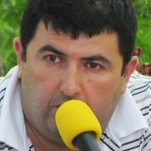
Magerram Qoyuşoglu: I represent a border region here. The Armenian-Azerbaijani conflict hasn’t passed us by; we have been living in it for 24 years. I agree with my colleagues, who say that deep gashes and an abyss between our people have been created during the 24 years. The cease-fire was signed 18 years ago, but, unfortunately, it isn’t respected. I wonder which side profits from violations of the agreement: Armenia or Azerbaijan? Or maybe some third States do? Being Azerbaijani, I can say that Azerbaijan does not. I even know that neither does Armenia, for they mean blood, death and shambles. A psychological barrier has been created between people, who could just sit down at a table and talk with one another. How could Armenian or Azerbaijani society influence the situation as long as neither of them, as far as I know, is very powerful in its own country? When the cease-fire is violated, at first we just hear the sounds of firing and only later learn how many casualties and from which side were there. As a representative of a CBO, I believe that a model of coordination must be created in order to work in that direction.
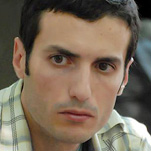
Samvel Israelyan: The Nagorno-Karabakh conflict is considered the one of the most protracted in the world. Despite all the efforts of world community, the conflict parties cannot reach a peace agreement acceptable both to their political leaderships and societies. The OSCE Minsk Group, which assumed the mediation in solving the problem, operates mainly with political instruments. When driven to the face of necessity of signing some agreement, the Armenian and Azerbaijani leaders generally plead the pressure of public opinion within their countries and lead the negotiations to a deadlock. Meanwhile a lot of foreign governmental and non-governmental organizations conduct various programs aimed at the rapprochement of the conflict parties’ societies. However, strictly speaking, there is no coordination between those political and societal processes; they sometimes even contradict one another. A good example is the well-known show when Armenian and Azerbaijani authorities, in front of international community, demonstrate their willingness to find some peaceful ways of conflict resolution but come out with warlike rhetoric within the country and approve of the outermost expressions of pseudo-patriotic or nationalist ideologies. It is high time to international and peacemaking organizations to clearly realize that their uncoordinated efforts on political and societal fronts are not only ineffectual but, in a certain sense, complicate the situation: it is just the waste (maybe even washing) of huge money.
Taking into account the genesis of the current Armenian and Azerbaijani administrations, we may take it as a fact that they are not interested in a really peaceful and final settlement of the conflict. The leaders of both countries came to power on the wave of war. The implicit war is not only a sinecure to them but also the justification of citizens’ distress. In case the conflict is settled, nationalist ideology would lose its topicality, and democratic changes would pick up the pace within both society and government. Therefore both Armenia’s and Azerbaijan’s political establishment does its best to convince society that the Karabakh problem has no peaceful solution, that Armenians and Azeries are incompatible “genetically”, that “the stronger will win”. It means we are fated to live under martial law. And martial law, as everybody knows, does not prioritize such things as social justice, the rule of law or human rights.
Taking into account the genesis of the current Armenian and Azerbaijani administrations, we may take it as a fact that they are not interested in a really peaceful and final settlement of the conflict. The leaders of both countries came to power on the wave of war. The implicit war is not only a sinecure to them but also the justification of citizens’ distress. In case the conflict is settled, nationalist ideology would lose its topicality, and democratic changes would pick up the pace within both society and government. Therefore both Armenia’s and Azerbaijan’s political establishment does its best to convince society that the Karabakh problem has no peaceful solution, that Armenians and Azeries are incompatible “genetically”, that “the stronger will win”. It means we are fated to live under martial law. And martial law, as everybody knows, does not prioritize such things as social justice, the rule of law or human rights.
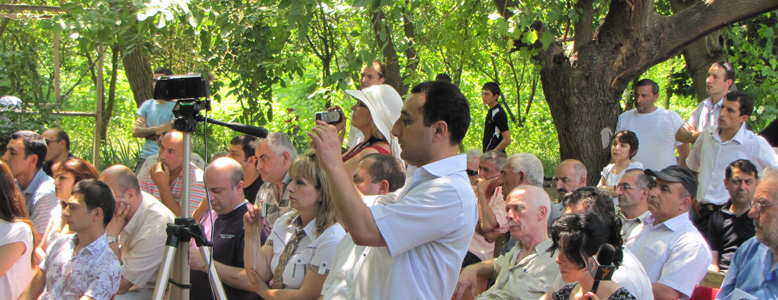
It would be naïve to deem that international community does not see the double game and hypocrisy of Armenia’s and Azerbaijan’s authorities. But the major actors on the world stage have their own interests in the region. Geopolitical developments show that the spheres of interests of the major powers in the Middle East, Central Asia and the Caucasus are not delimitated yet; anyway, there is no overall agreement. Armenia's and Azerbaijan’s current authorities, easy to manipulate with, are almost ideally fit to create a counterbalance to the influence of any one world power and prevent its total control over our region. In such a context it is clear why the major actors are so sluggishly dealing with the Karabakh conflict.
The unsettled conflict impedes the normal development not only of Armenia and Azerbaijan but also of the whole region. Nowadays the persistent escalation of tension, the virtual militarization of the conflict parties, the incessant anti-Armenian and anti-Azeri propaganda – all those are fraught with the resumption of the war. Hotheads on the both sides more and more often call to radical measures. Society in both countries actively discusses the supposedly existing possibility of the military solution of the conflict. It is awful to see that whole societies are being as easily drawn to the games of authorities as it was in Europe on the eve of World War II.
One would think the latest frontier incidents, with casualties on both sides, could have dispelled the hypnotic trance. But the overextendedness of the conflict, our authorities’ ultra-nationalist propaganda and the seeming hopelessness of the situation – all those altogether have resulted in the total loss of the instinct of self-preservation in our society. Many people on both sides realize that the new war would be long and sweeping, with huge casualties from both sides; it would also lead to a humanitarian catastrophe. It is difficult to estimate the economic consequences; one can only say they would be disastrous. Then forget democratic reforms, liberties, and all those modest achievements gained by the active part of society during many long years! Not only the conflict parties but also the whole region would be thrown many years back. It is clear that there would be no winner in the war.
The unsettled conflict impedes the normal development not only of Armenia and Azerbaijan but also of the whole region. Nowadays the persistent escalation of tension, the virtual militarization of the conflict parties, the incessant anti-Armenian and anti-Azeri propaganda – all those are fraught with the resumption of the war. Hotheads on the both sides more and more often call to radical measures. Society in both countries actively discusses the supposedly existing possibility of the military solution of the conflict. It is awful to see that whole societies are being as easily drawn to the games of authorities as it was in Europe on the eve of World War II.
One would think the latest frontier incidents, with casualties on both sides, could have dispelled the hypnotic trance. But the overextendedness of the conflict, our authorities’ ultra-nationalist propaganda and the seeming hopelessness of the situation – all those altogether have resulted in the total loss of the instinct of self-preservation in our society. Many people on both sides realize that the new war would be long and sweeping, with huge casualties from both sides; it would also lead to a humanitarian catastrophe. It is difficult to estimate the economic consequences; one can only say they would be disastrous. Then forget democratic reforms, liberties, and all those modest achievements gained by the active part of society during many long years! Not only the conflict parties but also the whole region would be thrown many years back. It is clear that there would be no winner in the war.
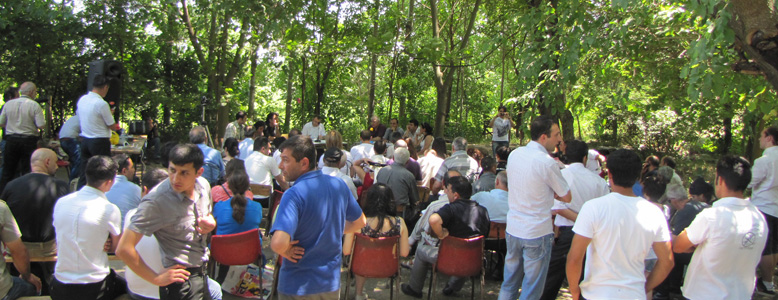
Taking into account the possibility of the resumption of military operations, conceiving the terrible consequences and the hopelessness of a new war, realizing the impossibility of retaining the “neither war, nor peace” state and believing in the attainability of an authentic, mutually beneficial, peaceful settlement of the Karabakh conflict, active part of Armenia’s, Azerbaijan’s and Nagorno-Karabakh’s societies must take the following steps:
- to make their voice heard declaring their non-acceptance of war;
- to make it clear to our authorities that a new war would provide not a guarantee of their power or security but the occasion for overthrowing and punishing them;
- to consolidate our actions: to reinforce the existing relations between Armenian and Azerbaijani peacemakers and create new platforms for cooperation;
- to brisk up the discussion on alternative scenarios of conflict resolution in our societies. Society must actively participate in searching a plan of the peaceful settlement of the Nagorno-Karabakh conflict.
I think Tekali is a very good platform for such an initiative. I’d like to stress that so far our authorities have been saying the resolution of the conflict to be their exclusive prerogative, that is to say, “Don’t interfere, our societies. We’ll come to an agreement with each other and resolve every problems all by ourselves”; however, we can see that not only they haven’t come to any agreement but things have been going from bad to worse. I submit a proposal: let us become, if possible, a kernel of such a society that would be able to bring up for discussion in our countries the possibility of a peaceful solution of the conflict and the expediency of looking for such a solution just within society, through debates and discussions at meetings like this one. Thank you. I also have some proposals as to the practical aspect of the question, but I’ll present them later, for my time is expired.
- to make their voice heard declaring their non-acceptance of war;
- to make it clear to our authorities that a new war would provide not a guarantee of their power or security but the occasion for overthrowing and punishing them;
- to consolidate our actions: to reinforce the existing relations between Armenian and Azerbaijani peacemakers and create new platforms for cooperation;
- to brisk up the discussion on alternative scenarios of conflict resolution in our societies. Society must actively participate in searching a plan of the peaceful settlement of the Nagorno-Karabakh conflict.
I think Tekali is a very good platform for such an initiative. I’d like to stress that so far our authorities have been saying the resolution of the conflict to be their exclusive prerogative, that is to say, “Don’t interfere, our societies. We’ll come to an agreement with each other and resolve every problems all by ourselves”; however, we can see that not only they haven’t come to any agreement but things have been going from bad to worse. I submit a proposal: let us become, if possible, a kernel of such a society that would be able to bring up for discussion in our countries the possibility of a peaceful solution of the conflict and the expediency of looking for such a solution just within society, through debates and discussions at meetings like this one. Thank you. I also have some proposals as to the practical aspect of the question, but I’ll present them later, for my time is expired.

Natiq Cavadli: Why is there neither public opinion nor public influence? Because we haven’t had a strong democratic State or government so far in either of the two countries. International organizations are profiting by the situation because they are only interested in oil and geopolitics. Local politicians were quick to seize the opportunity and make Karabakh a tool of their enrichment. That became a catastrophe for both nations. Look, how many times we have seen the change of power for 20 years, and every new government came to power under the “Karabakh!” slogan. Ter-Petrosian and Elcibey had a chance to come to an agreement, but the way was barred because Russia did not want conciliation and the West was interested but in oil. The theme of Karabakh has become monopolized by the State in our both countries. In Armenia, there are at least some institutes; the theme is even discussed in parliament. In Azerbaijan, the last parliamentary discussion on the Karabakh problem took place in 2001. Heydar Aliev had to change the agenda after the elections of 2000 (as you know, opposition lost them); that’s why he decided to publish a proposal, which was made at the negotiations. Whatever social problems may be in Azerbaijan, Karabakh remains our main problem, but nobody can speak about it because of the governmental pressure.
As a journalist, I think that the job of international organizations should consist in urging foreign governments to influence the governments of Armenia and Azerbaijan in order that democratic processes developed in these countries. Peoples can carry on talks with one another only when democracy has been developed, not earlier. Were we living in democratic States, we could arrange the meetings like this one in Armenia and Azerbaijan, not here in Georgia.
As a journalist, I think that the job of international organizations should consist in urging foreign governments to influence the governments of Armenia and Azerbaijan in order that democratic processes developed in these countries. Peoples can carry on talks with one another only when democracy has been developed, not earlier. Were we living in democratic States, we could arrange the meetings like this one in Armenia and Azerbaijan, not here in Georgia.

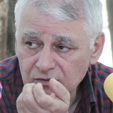

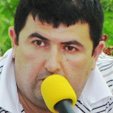
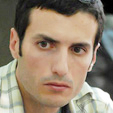
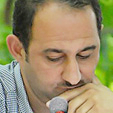
ROUND TWO: COMMENTS
Louisa Poghosyan: Perhaps we should start a controversy to enliven the audience. So I am going to share with you some observations of mine: the mirror reflection of positions takes place at every Armenian-Azerbaijani meeting. I think Samvel and Natiq have looked in such a mirror today. As far as I understand it, you seem to put all the blame on the factor of our governments’ illegitimacy. I have a question: suppose, a candidate from opposition is elected president by a majority vote through legitimate election; if his program (like that of Armenian opposition) doesn’t contain any clear program of conflict resolution – say, the immediate return of the 6 occupied territories of Azerbaijan in exchange for the recognition of Karabakh’s independence by Azerbaijan – what will change? If, as the result of this most important, as you believe it, struggle for democracy, a legitimately elected president all of a sudden comes to power, where is a guarantee that the situation in the conflict zone will change in any way? Maybe the elections that ratify the will of majority seem a fairy-tale in our countries just because nowadays the majority, owing to the fact that there is a conflict and terror, gives way to the terror and supports the terror? And even the legitimate majority rule wouldn’t be able to solve the problems that we have in our countries – that is to ensure security of people living in our countries?
The root of the word vmeshatel’stvo (interference) is meshat’ (to interfere, to oppose). I believe that social phenomena, which oppose the conditions under which we are living, give us some hope by the very fact of their existence. But, unfortunately, being in opposition is not enough to change the situation. Being in opposition does not relieve us of responsibility for what is happening today. Magerram gently expressed the demand to change the situation on behalf of those who hear bullets whistle. I can do my best to oppose what is happening in Armenia nowadays, it may last as it is infinitely, and then some new troublemakers may come to take my place. But I think we need a third party interested in changing the situation. I believe this third party is Georgia, which may become a party owing to its closeness to our borders, by the virtue of its independence from our governments, which are doomed to be illegitimate, by the virtue of the fact that Georgia is able to realize, on the mental level, what a post-Soviet conflict is and how wrong it is to turn the blind eye to developments in a conflict zone. The conflict takes place in the zone where people are killed, not in the capitals or elsewhere: it assumes its material form in the border zone. To have some influence upon the frontier zone is enough to make progress in the political resolution of the conflict. In my opinion, the only country that has enough resource to intervene into the tick of the conflict is Georgia, the citizens of Georgia. It is the only intervention that could become constructive.
The root of the word vmeshatel’stvo (interference) is meshat’ (to interfere, to oppose). I believe that social phenomena, which oppose the conditions under which we are living, give us some hope by the very fact of their existence. But, unfortunately, being in opposition is not enough to change the situation. Being in opposition does not relieve us of responsibility for what is happening today. Magerram gently expressed the demand to change the situation on behalf of those who hear bullets whistle. I can do my best to oppose what is happening in Armenia nowadays, it may last as it is infinitely, and then some new troublemakers may come to take my place. But I think we need a third party interested in changing the situation. I believe this third party is Georgia, which may become a party owing to its closeness to our borders, by the virtue of its independence from our governments, which are doomed to be illegitimate, by the virtue of the fact that Georgia is able to realize, on the mental level, what a post-Soviet conflict is and how wrong it is to turn the blind eye to developments in a conflict zone. The conflict takes place in the zone where people are killed, not in the capitals or elsewhere: it assumes its material form in the border zone. To have some influence upon the frontier zone is enough to make progress in the political resolution of the conflict. In my opinion, the only country that has enough resource to intervene into the tick of the conflict is Georgia, the citizens of Georgia. It is the only intervention that could become constructive.
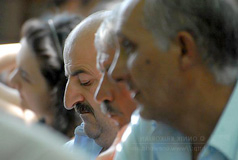
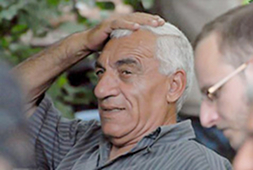
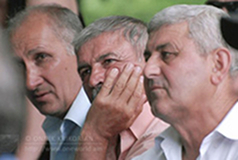
Ali Abasov: As you can see, dear friends, instead of debate we have a kind of opinion exchange: everyone is developing the same ideas by advancing different reasons. Nevertheless, it seems two points of view have taken shape. The first is that our authorities won’t let anybody do anything with this problem. I myself am a big critic of South-Caucasian authorities: it is my favorite job. The other position is: civil society itself must do something and organize things. You know, Western politicians often criticize us, saying, “In the South Caucasus, you want to solve all problems at one go and get everything at once. You should go unhurriedly, step by step, and you want to get all what you want right away.” Indeed, I own it: we like to be maximalists in everything, but our problem is just of the kind that cannot be solved by maximalists, and we have to start from primary organizational steps. I think one of them could be a monitoring, which could be performed by both sides, a civil monitoring, because the information that goes to the press is so processed that it is difficult to understand anything: our press writes it was the Armenian side that started, and Armenian press writes it was Azerbaijan’s. In fact, firearm in itself is all-sufficient cause of shooting; political decisions are another cause… It is their business, and you may criticize authorities for that, but now it would be better, perhaps, to begin with self-criticism. Are you ready to do this work? Can our today’s meeting become the beginning of the way leading to a change of the situation? If so, we must make concrete steps: choose the best of what is proposed in today’s good speeches and make it our common cause. We must create our own mafia – a noble mafia that won’t kill anyone. I think it is an important question – the first of those on which the sides could come to mutual understanding. At this point we must have maximum confidence in one another, then we could go further. It’s very important.
I can but agree that without Georgia’s consent we’ll fall for a series of reasons. I would just add that our projects are often bilateral but in fact they should be trilateral (I mean the number of the countries represented) because our problems are so interlaced with one another, the dynamic of our development, our errors etc. are so similar. I think our mutual experience would be useful here, there and everywhere. Of course, it would be good if the movement that is starting today (perhaps my words may seem too high-flown) took on international significance and won international recognition. I think it would be very important if we could win, step by step, international recognition. Believe me, I sometimes have the impression that our authorities, too, feel in a deadlock. Anyway, they are human beings, you know. Killing people makes nobody glad – especially such kind of killing. I have already said that, in principle, it is just the same as the death penalty. When being executed, man at least knows what for...
Let us pretend that no authorities exist. Isn’t it a good stand? We will do our own work and see the result: there will be none to blame or to compliment but ourselves.
Moderator: Thank you for such a constructive approach: in fact, you are spurring us on to actions.
Ali Abasov: I am.
I can but agree that without Georgia’s consent we’ll fall for a series of reasons. I would just add that our projects are often bilateral but in fact they should be trilateral (I mean the number of the countries represented) because our problems are so interlaced with one another, the dynamic of our development, our errors etc. are so similar. I think our mutual experience would be useful here, there and everywhere. Of course, it would be good if the movement that is starting today (perhaps my words may seem too high-flown) took on international significance and won international recognition. I think it would be very important if we could win, step by step, international recognition. Believe me, I sometimes have the impression that our authorities, too, feel in a deadlock. Anyway, they are human beings, you know. Killing people makes nobody glad – especially such kind of killing. I have already said that, in principle, it is just the same as the death penalty. When being executed, man at least knows what for...
Let us pretend that no authorities exist. Isn’t it a good stand? We will do our own work and see the result: there will be none to blame or to compliment but ourselves.
Moderator: Thank you for such a constructive approach: in fact, you are spurring us on to actions.
Ali Abasov: I am.

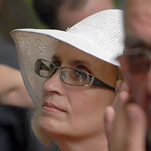
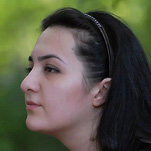
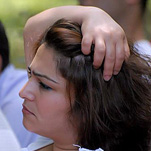
Yury Manvelian: You spoke about the impossibility of any dialogue in the absence of democracy; you said that even if we imagine some democratic process – for instance, more or less fair elections – still it wouldn’t affect the Karabakh problem. I certainly cannot agree with you. If we really imagine a democratic process, democratic reforms, in the two countries, even the mentioned elections… Elections are not just dropping ballot-papers into a box on the election day: they are a function of such an institute as journalism. A democratic process means the conversion of education – school education, pre-school education and university education – into genuine education, not into what it has conversed into in our countries; it means the humanities become humanities, not what we have now. If journalists practice journalism, the process will give them more opportunities to announce such positions and submit them for discussion. Then they will sound not here but on live on the most popular TV channel, and the democratic process will help us to resolve the conflict. We say, “Society is not willing” or “People are not willing”, but there isn’t a mechanism by which we could learn what they are willing: everything is blocked. If I judged what people in today’s Azerbaijan think by Russian-language online press, it would be a sheer horror; I wouldn’t have any incentive to take part in any events. But, thank heavens, I know not only what the Russian-language sites translate. I may say the same about Armenian sites as well. There is some cleft, some leak: there are some people, who practice journalism. That’s why I think a democratic process would hasten some solution of the problem and make it more achievable or create an opportunity to achieve it step by step.
Magerram Qoyuşoglu: I have a question. At those negotiations, the Azerbaijani State speaks in support of territorial integrity. Public opinion also supports this stand. What is the attitude of Armenian society in this respect? Dear colleagues, you put blame on the authorities or the State of both sides. I agree with you: we are in want of democratic processes – this is our week point. But I’d like to know whether public organizations are able to do away with the psychological barrier between the two peoples. A cemetery of the killed has appeared in my region at the time of the conflict. I do not know how their mothers would respond if I came and told people today that a compromise is possible. How could these psychological barriers be overcome? I want to put this question for discussion: how could we overcome the psychological barrier? In fact, this is what our role is.
Magerram Qoyuşoglu: I have a question. At those negotiations, the Azerbaijani State speaks in support of territorial integrity. Public opinion also supports this stand. What is the attitude of Armenian society in this respect? Dear colleagues, you put blame on the authorities or the State of both sides. I agree with you: we are in want of democratic processes – this is our week point. But I’d like to know whether public organizations are able to do away with the psychological barrier between the two peoples. A cemetery of the killed has appeared in my region at the time of the conflict. I do not know how their mothers would respond if I came and told people today that a compromise is possible. How could these psychological barriers be overcome? I want to put this question for discussion: how could we overcome the psychological barrier? In fact, this is what our role is.
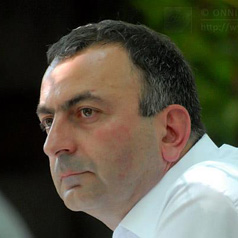


Samvel Israelian: I am gladly surprised to see the participants – both Armenians and Azeries – for the most part unanimous that the illegitimacy of authorities and international conjuncture are relevant to the problem of conflict solution – a genuinely peaceful solution. What does it mean? It means our countries’ community has some possibility of influencing the processes around the conflict. If we have legitimate authorities, there will be no need in nationalistic rhetoric used by the current authorities, which always say, “Here are your enemies, you are in danger!” That is, the main question in democratic society will be how to find the conflict resolution. Neither society, nor politicians have such a question on their agenda. I think our society must live up its activities in this direction. I think we should try to find solutions by ourselves: to start our own discussions, to reach common decisions and – why not? – to thrust our decisions on our authorities. In short, we should try to somehow influence our authorities to make them give up their war rhetoric, by which they try to cow our peoples. Truth to tell, Magerram raised very serious and painful questions. They can be answered, believe me. The mothers, who have lost their sons, are on the both sides of the borders; they feel very miserable, enough to make anybody weep – not only them but the rest of society as well. But everyone should realize that we must start, start from the beginning, in order to prevent repetition, to prevent their list from growing, in order that people do not continue to die for nothing. We must turn over a new leaf and start acting at once.
Natiq Cavadli: I do not contend that, as soon as we have legitimate authorities, the Karabakh problem will be solved. It must be a gradual process: our societies must become transparent and get rid of corruption. I’d like to tell you a story. Once, when in Sweden, a Russian journalist looked at a monument to Charles XII and asked, “He lost the war, didn’t he? Then why did they put a monument to him?” I answered, “Hadn’t he lost the war, there wouldn’t be such a State as modern Sweden is. Now look at Russia and at Sweden and compare how they are getting on.” Democratic institutions must grow stronger. The process must have gathered strength. The governments must work with our societies and international community, especially with Russia. The main problem in the South Caucasus is that democracy building here is still Putin’s prerogative. Thus the democratization of Russia is in our own interests.
Natiq Cavadli: I do not contend that, as soon as we have legitimate authorities, the Karabakh problem will be solved. It must be a gradual process: our societies must become transparent and get rid of corruption. I’d like to tell you a story. Once, when in Sweden, a Russian journalist looked at a monument to Charles XII and asked, “He lost the war, didn’t he? Then why did they put a monument to him?” I answered, “Hadn’t he lost the war, there wouldn’t be such a State as modern Sweden is. Now look at Russia and at Sweden and compare how they are getting on.” Democratic institutions must grow stronger. The process must have gathered strength. The governments must work with our societies and international community, especially with Russia. The main problem in the South Caucasus is that democracy building here is still Putin’s prerogative. Thus the democratization of Russia is in our own interests.
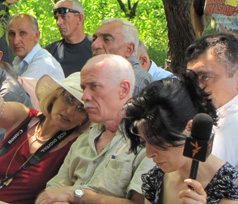
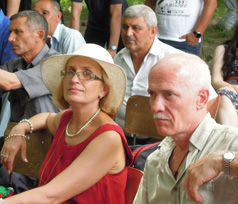
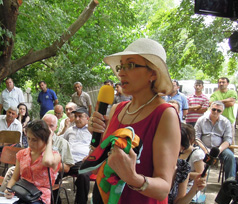
ROUND THREE: QUESTIONS AND ANSWERS
Mamuka Kuparadze, Tbilisi, Georgia: Good afternoon! I am glad to greet your format and wish good luck to its participants and guests. My question is: does the opinion of civil society differ from the ideas of those who are dealing with the political settlement? Do the both sides purpose similar aims? The conflict sides seem to see the settlement in different ways. Then where do your aims coincide?
Galina Petriashvili, Tbilisi, Georgia: I’ve participated in a series of peace projects, representing the women’s perspective. You know it was very interesting to listen to everything you said, and it is a really important project. I hold in high respect what you do, that’s why I often attend your meetings. But I am embarrassed when we speak about everything at once: from the legitimacy of authorities to whom Karabakh belongs: “Give it up! – No, we won’t! – “Yes, you shall! – No, we won’t!” At the same time we say we should go step by step, casting aside some things, which we are quite unable to settle in this format yet. In my opinion, it is critically important for this project to concentrate on something, which isn’t over your (or our) head, which we can do without an extra confrontation with one another. I think we all understand what I mean. Georgia is a mediator, and here we are, in a Georgian frontier village – OK, but perhaps we’d better confine our discussion with some more modest but not less important things than the territorial problem. I, for instance, would rather speak about the hate speech or nationalisms of both sides.
Finally, I’d like to tell you a story. I have recently been to Goris, on the border with the Lachin district, and they were saying there, “What a horror! A man was working in his garden, and they killed him.” Next day, when I was back in Tbilisi, an Azeri women came and said, “Just imagine: they have killed our child. A stray bullet…” And for all that – fierce mutual hatred, in both villages. Now I think: what if we take up this issue and try to somehow clear these minefields of mutual hatred, to do away with that hate speech? It would be great to concentrate on this task. I think we should proceed from reality and move forward very gradually. This is my opinion. And here is my question: what do you think about it?
Galina Petriashvili, Tbilisi, Georgia: I’ve participated in a series of peace projects, representing the women’s perspective. You know it was very interesting to listen to everything you said, and it is a really important project. I hold in high respect what you do, that’s why I often attend your meetings. But I am embarrassed when we speak about everything at once: from the legitimacy of authorities to whom Karabakh belongs: “Give it up! – No, we won’t! – “Yes, you shall! – No, we won’t!” At the same time we say we should go step by step, casting aside some things, which we are quite unable to settle in this format yet. In my opinion, it is critically important for this project to concentrate on something, which isn’t over your (or our) head, which we can do without an extra confrontation with one another. I think we all understand what I mean. Georgia is a mediator, and here we are, in a Georgian frontier village – OK, but perhaps we’d better confine our discussion with some more modest but not less important things than the territorial problem. I, for instance, would rather speak about the hate speech or nationalisms of both sides.
Finally, I’d like to tell you a story. I have recently been to Goris, on the border with the Lachin district, and they were saying there, “What a horror! A man was working in his garden, and they killed him.” Next day, when I was back in Tbilisi, an Azeri women came and said, “Just imagine: they have killed our child. A stray bullet…” And for all that – fierce mutual hatred, in both villages. Now I think: what if we take up this issue and try to somehow clear these minefields of mutual hatred, to do away with that hate speech? It would be great to concentrate on this task. I think we should proceed from reality and move forward very gradually. This is my opinion. And here is my question: what do you think about it?
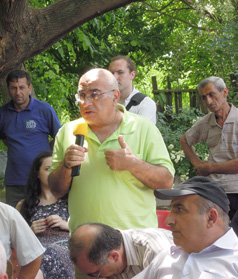

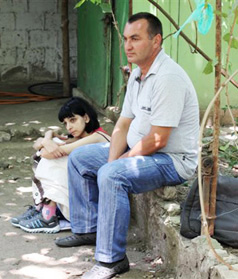
Niyazi Mehdi, Baku, Azerbaijan: Argentina is a democratic country, but the problem of the Falkland Islands doesn’t seem to be resolved yet. As far as I know, neither does the Gibraltar problem. Maybe, proceeding from such facts, we should somehow rectify the thesis, which I like, too: that the solution of the Karabakh problem is only possible when the both sides become democratic countries? What do you think?
Georgi Vanyan, Yerevan, Armenia: Dear friends, it is people from our frontier zone who are here today. Let’s not forget the subject of our hearing. Geopolitical analyses won’t give us the answers to our questions. Our 18- and 19-year-old children, both Armenian and Azeri, are perishing at the border. Please don’t forget that our point is: can we human beings and citizens, influence, interfere in or prevent such barbarities? To a Baku or Yerevan dweller, the Armenian-Azerbaijani conflict is one matter; to those, who now and then hear bullets whistle – at school or in a kindergarten – and to our sons, who are serving in our armies, it is quite another matter. Let’s us remember that finally we are going to vote, and it won’t be just a formal voting – it will answer the question: are we able or unable? That is, are we paralyzed by the conflict or we still can do something? That is, can we oppose the death of children and take some concrete steps that Ali Abasov spoke of and our speakers are already inclined to? I would be very grateful if I heard the opinion of those, who live on the frontline, and those, whose children die every day there.
Sabina Talybova, Marneuli, Georgia:Mr. Georgy has just urged us again: let’s vote and decide whether civil society or the human factor can influence the developments of the settlement of the Nagorno-Karabakh conflict, that is the conflict between Armenian and Azeri populations. You know, in order to vote I as a Georgian citizen and ethnic Azeri, have to understand what positive impact, in my case, my actions could have upon all those processes; and I cannot understand it at all. Mrs. Louisa said she was sure our influence, I mean Georgian influence, would be productive. But she didn’t specify what kind of influence she meant. I want to say that in Georgia, the relations between Azeri and Armenian people were splendid even at the height of the Armenian-Azerbaijani war; I mean there was no such hate speech here, in Georgia. Maybe each of the sides was nursing some grudge, but it did not affect the mutual relations. That is to say, within Georgia, the relations are stable, collegial and friendly. But what do you mean exactly? How could Georgian citizens influence the developments? Please specify your suggestions so that we knew what we are voting for. Because if we can just raise our hands and vote for it, it doesn’t mean we can do anything concrete.Another point: Mr. Ali said that Georgia as a State could contribute its positive mite. Mr. Yura mentioned that our presidents meet each other in Russia, and it is a very important fact that Russia exerts influence upon unimportant matters, which we (I mean the Armenian and Azerbaijani sides) are able to settle ourselves.
Georgi Vanyan, Yerevan, Armenia: Dear friends, it is people from our frontier zone who are here today. Let’s not forget the subject of our hearing. Geopolitical analyses won’t give us the answers to our questions. Our 18- and 19-year-old children, both Armenian and Azeri, are perishing at the border. Please don’t forget that our point is: can we human beings and citizens, influence, interfere in or prevent such barbarities? To a Baku or Yerevan dweller, the Armenian-Azerbaijani conflict is one matter; to those, who now and then hear bullets whistle – at school or in a kindergarten – and to our sons, who are serving in our armies, it is quite another matter. Let’s us remember that finally we are going to vote, and it won’t be just a formal voting – it will answer the question: are we able or unable? That is, are we paralyzed by the conflict or we still can do something? That is, can we oppose the death of children and take some concrete steps that Ali Abasov spoke of and our speakers are already inclined to? I would be very grateful if I heard the opinion of those, who live on the frontline, and those, whose children die every day there.
Sabina Talybova, Marneuli, Georgia:Mr. Georgy has just urged us again: let’s vote and decide whether civil society or the human factor can influence the developments of the settlement of the Nagorno-Karabakh conflict, that is the conflict between Armenian and Azeri populations. You know, in order to vote I as a Georgian citizen and ethnic Azeri, have to understand what positive impact, in my case, my actions could have upon all those processes; and I cannot understand it at all. Mrs. Louisa said she was sure our influence, I mean Georgian influence, would be productive. But she didn’t specify what kind of influence she meant. I want to say that in Georgia, the relations between Azeri and Armenian people were splendid even at the height of the Armenian-Azerbaijani war; I mean there was no such hate speech here, in Georgia. Maybe each of the sides was nursing some grudge, but it did not affect the mutual relations. That is to say, within Georgia, the relations are stable, collegial and friendly. But what do you mean exactly? How could Georgian citizens influence the developments? Please specify your suggestions so that we knew what we are voting for. Because if we can just raise our hands and vote for it, it doesn’t mean we can do anything concrete.Another point: Mr. Ali said that Georgia as a State could contribute its positive mite. Mr. Yura mentioned that our presidents meet each other in Russia, and it is a very important fact that Russia exerts influence upon unimportant matters, which we (I mean the Armenian and Azerbaijani sides) are able to settle ourselves.


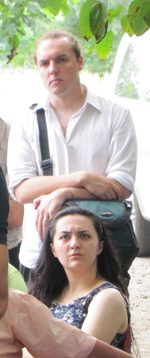
Look, when we had the conflict in 2008, even a blind man could see it was a conflict with Russia: we have no conflicts with our own citizens. And now think: if Georgia as a State proposes itself as mediator in the settlement of the Nagorno-Karabakh conflict, won’t it entail a new Russian aggression against Georgia? When discussing such matters, please keep in mind that our own country has suffered a lot from Russia. I mean, to me it’s very important.
I would also like to speak about democracy. It was said that if democracy in both countries (I mean Armenia and Azerbaijan) gathers strength and develops, it would entail the conflict settlement in the shortest possible time. Let’s keep in mind that our Caucasian mentality is much stronger than any democracy. Why, if we people of hot blood are so fond of one another – cannot we normally greet one another and… well, enter into fine human relations with one another when we meet in a neutral country? – it means that our mentality can overcome the language of hate. And yet another point: democracy in our countries – I mean in the Caucasus – isn’t the same as democracy in the West or in Europe. We may have a quite different format of democracy here. And in order to understand what democracy is, we mustn’t forget, of course, that we have our own inner values. Thank you very much.
Armen Vardanian, Gyumri, Armenia: I’d like to sum up what we’ve heard and then to make a suggestion or put a question. We have to deal with authorities, with those, who have usurped authority or a criminal group that usurps it – I mean in Armenia, but I do not think the situation in Azerbaijan is very different. All those usurpers try to retain the power by using some slogans – first of all, sustaining the enemy image. What shall we do first of all? A very simple, clear answer suggests itself: destroy the enemy image. How should we do it? My question is: through culture. Zaur told me a very interesting story yesterday, about an Azeri woman, who had come from Armenia. Today Ashot, who I have been working with for several years (and have known him for several decades), has told the story about an Azeri man, who came in his own car to help earthquake victims in Armenia, when we had the earthquake, in the beginning of the conflict. As to democracy, I’d like to make one remark: of course, democracy is a fine thing, but let’s not forget that fascists came to power in Germany through democratic election. We cannot set all our hopes upon democracy. I believe we may and we should concentrate our main efforts on culture, only on culture – to dash, to destroy the enemy image. I am a cinema man, that’s why I say so. If we shoot films about those two stories, it would be yet another brick into the wall of destroying the enemy image. Sorry for the tautology (sic. – Translator’s note).
Armen Vardanian, Gyumri, Armenia: I’d like to sum up what we’ve heard and then to make a suggestion or put a question. We have to deal with authorities, with those, who have usurped authority or a criminal group that usurps it – I mean in Armenia, but I do not think the situation in Azerbaijan is very different. All those usurpers try to retain the power by using some slogans – first of all, sustaining the enemy image. What shall we do first of all? A very simple, clear answer suggests itself: destroy the enemy image. How should we do it? My question is: through culture. Zaur told me a very interesting story yesterday, about an Azeri woman, who had come from Armenia. Today Ashot, who I have been working with for several years (and have known him for several decades), has told the story about an Azeri man, who came in his own car to help earthquake victims in Armenia, when we had the earthquake, in the beginning of the conflict. As to democracy, I’d like to make one remark: of course, democracy is a fine thing, but let’s not forget that fascists came to power in Germany through democratic election. We cannot set all our hopes upon democracy. I believe we may and we should concentrate our main efforts on culture, only on culture – to dash, to destroy the enemy image. I am a cinema man, that’s why I say so. If we shoot films about those two stories, it would be yet another brick into the wall of destroying the enemy image. Sorry for the tautology (sic. – Translator’s note).
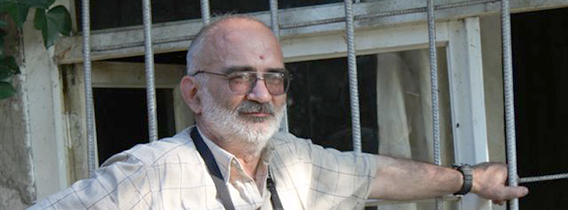
Alexander Avsajanishvili, Tbilisi, Georgia: I have both a question and a proposal about some micro-steps and the possibilities of public organizations. Here is the question: have there been any attempts to investigate concretely every specific episode of opening fire: who were the initiators, who ordered, or was it, so to speak, just a fit of madness? And here is my proposal – in fact, it is just within the bounds of possibilities of public organizations: inquiring from both sides. As far as I understand it, both sides are always indifferent: somebody’s opened fire, people are killed, but why? – Nobody knows. I mean if every incident would be investigated – who ordered or who went crazy – then it would make the assaulter personally responsible. I think in such a case many people would refrain from pulling the trigger. So I repeat my question: have there been any attempts of inquiring?
Zaur Dargali, Marneuli, Georgia: I’d like to return for a moment to the theme of culture. Before using culture to solve our problem, we should first think how to solve the problem of dolma or Sari Gyalin. (A traditional dish and a folk song, both popular in both countries. The conflict sides accuse each other of usurping the authorship of both. - T. N.) And I have a question to both sides as representatives of public sector: I wonder whether any concrete mechanisms are being developed in their countries to solve the problems of Armenian-Azerbaijani relations – I mean analytical documents. Say, a favorable opportunity turns up: what shall we do firstly? what shall we do secondly? Is there such a mechanism? Has anybody thought of it?
Lado Charatashvili, Tbilisi, Georgia: I, too, want to give my view on the problem: I think however hard we try and whatever we say here, no conflict will be settled before Russia leaves the region. We should have started this meeting with the demand that Russia got away. We must start our common platform with this demand and state it plainly, in so many words, in the document you are going to vote for: that it should leave us alone with one another so that we settled everything by ourselves. I’ve been listening to you very attentively, and I cannot see a key to the conflict settlement in the region as long as Russia remains here. As to democracy, it hasn’t saved Georgia nor settled our Georgian conflict either.
Zaur Dargali, Marneuli, Georgia: I’d like to return for a moment to the theme of culture. Before using culture to solve our problem, we should first think how to solve the problem of dolma or Sari Gyalin. (A traditional dish and a folk song, both popular in both countries. The conflict sides accuse each other of usurping the authorship of both. - T. N.) And I have a question to both sides as representatives of public sector: I wonder whether any concrete mechanisms are being developed in their countries to solve the problems of Armenian-Azerbaijani relations – I mean analytical documents. Say, a favorable opportunity turns up: what shall we do firstly? what shall we do secondly? Is there such a mechanism? Has anybody thought of it?
Lado Charatashvili, Tbilisi, Georgia: I, too, want to give my view on the problem: I think however hard we try and whatever we say here, no conflict will be settled before Russia leaves the region. We should have started this meeting with the demand that Russia got away. We must start our common platform with this demand and state it plainly, in so many words, in the document you are going to vote for: that it should leave us alone with one another so that we settled everything by ourselves. I’ve been listening to you very attentively, and I cannot see a key to the conflict settlement in the region as long as Russia remains here. As to democracy, it hasn’t saved Georgia nor settled our Georgian conflict either.
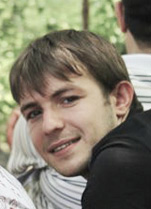
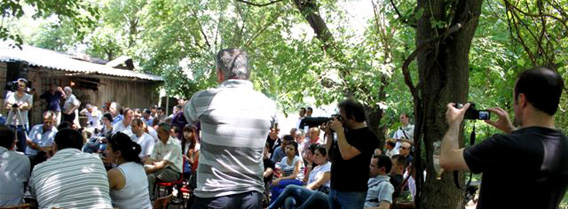
Malkhaz Chemia, Tbilisi, Georgia: I am a conflictologist, an expert in both unleashing and settling conflict, because I took part in the Georgian-Ossetian and Abkhaz wars in the ‘90s but also took part in the European Commission program of the rehabilitation of the zone of the Georgian-Ossetian conflict. And I saw that in 1998, when we, together with OSCE and EU people, entered Tskhinvali in their car, it was dangerous to us to get out of the car; and after two or three years, when we started our “fifty-fifty” economic projects, as well as some cultural ones – I mean, half for the Georgian population, half for the Ossetian – we were calmly walking around Java and Tshinvali and even Georgian Lari appeared in both towns. By 2002, the Georgian-Ossetian conflict had been practically, though non-officially, settled both on the societal and political levels. So we do have such experience. The question is: how could it be transferred into Azerbaijani-Armenian relations? We represent some political or public movements, but we cannot become a political party, though we need political publicity desperately. You asked what models of settling the Karabakh problem are available. Of course, no Armenian even if he wouldn’t mind returning Karabakh or the occupied territories to Azerbaijan, can declare so, can he? Neither would any Azeri agree with the violation of territorial integrity of his State. But there are models: there is Emerson’s platform and other stabilization platforms for the South Caucasus; there are a lot of techniques tested and approved by Europeans, which could work here. I agree with you: there is an interfering factor. But even the Russian factor is used as a positive one in those models. If the Caucasian union or region manages to balance the interests of infra-Caucasian regions – those of Karabakh, Abkhazia or Ossetia – in transnational interests, the peaceful settlement has good prospects. Then our declarations that we want a bloodless settlement of the conflict won’t be just declarations. That’s why I, on behalf of us all, address to Mrs. Louisa and Mr. Georgia now: this is already the fourth or fifth time that we assemble and discuss important questions, yes, quite important ones. To say the truth, I expected that we could have done a further step and to become a public organization, an international organization (of course, with the support of our international donors or colleagues); and create some structures in Georgia, in Azerbaijan and in Armenia on behalf of the organization not of individuals, as heroic as they are. Then there would be no extra aggression from Russia, for we would be integrated into a general course or current. I ask you: what organizational matters are still to be settled, what structures to be created, what problems to be cleared? I’d like to hear your opinion.
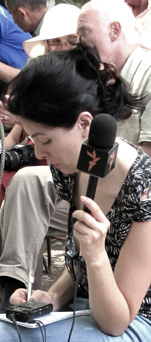
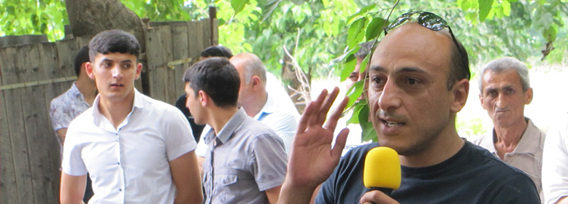
Louisa Poghosyan: I’ll try to answer the questions that I can answer. What do I mean speaking about Georgia’s participation? Perhaps I did speak in too general terms and it was really hard to understand. I’ll try to reformulate it. Indeed, a human right activist has no nationality, and there is nothing special in the Georgian human right activist. This is our third meeting in Tekali. Perhaps, three is not many, but, in my opinion, the meetings have revealed our main problem: it is our inertness. Every human being, of course, is able to rush to save another’s life, and, of course, he’d like to have a chance to. But the crucial question, which he cannot answer, is: where he should be for that and what he should do. It is very hard to sit and think on this alone. Could we transform ourselves into a body, a structure with its members: the people, who would get the answers from their organization on where they should be and what they should do in order to prevent killing or harming people? The formula is quite simple: it is an NGO, where every comer can play some role.
Another question was: what has been done up to now? There are a lot of analytical works, including those on tension-reducing measures for the dividing line. In my view, the particularity of this Tekali hearing is the question on its agenda. Maybe we are getting into the same trap of perpetual reiteration of common truth, but maybe the very urgency of the topic will remove the inert stumbling-block of perpetual talking off our way. And again on Georgia’s participation: in my opinion, everything is quite simple, why should we complicate things? He, who wants to protect another’s rights, would never do any harm. That’s my opinion.
Another question was: what has been done up to now? There are a lot of analytical works, including those on tension-reducing measures for the dividing line. In my view, the particularity of this Tekali hearing is the question on its agenda. Maybe we are getting into the same trap of perpetual reiteration of common truth, but maybe the very urgency of the topic will remove the inert stumbling-block of perpetual talking off our way. And again on Georgia’s participation: in my opinion, everything is quite simple, why should we complicate things? He, who wants to protect another’s rights, would never do any harm. That’s my opinion.
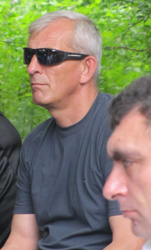
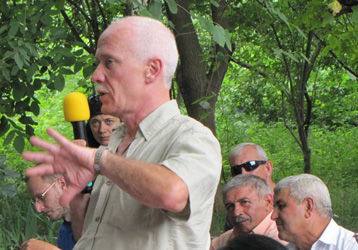

Ali Abasov: I, too, would like to summarize some points. As a matter of principle, we shouldn’t be divided: all should work together. This problem usually crops up in every conflict. Perhaps, in Georgia, too, there was time when it was so or, to a certain extent, is so even now. We mustn’t disregard this problem. We’ll be engaged on the level of our civil societies and NGOs, so there is nothing that could provoke a Russian intervention. As to concrete steps… Well, for some reason we decided to put this question – whether we can/cannot manage – to the vote… Maybe, the vote has sense after all, why not?
I think one procedure seems infallible: to clear up the status of snipers. In time of war, a sniper has a definite legal status. We should examine their status in time of truce: from the point of view of international law, they must be outlaws. And the problem may be decided in so far as then we might organize external, international pressure, which would bereave them of any status and make them outlaws. That is, a country resorting to those mercenaries (as far as I know, there are a lot of invited foreigners among snipers) will infringe international law and exposed to appropriate sanctions. This seems to be one of the suggestions that we could use.
The next point: about actually creating some structure. As to how it will be registered and what will be used for, we might elect coordinators for, so to speak, our future common cause – on a voluntary basis, of course. We must also think how to publicize our activities. Publicity is very important. Here we have journalists as well as TV and radio people, haven’t we, and I think they are going to report about our today’s event; but it would be a good thing to have some kind of site as a venue for those, who are willing to join our struggle. This was how the International Movement to Ban Landmines did, and I think we could do the same.
Yury Manvelyan: There has been said a lot here, and I just want to dot some "i's" as regards some questions asked: none of us represents his country’s foreign ministry. We are not politicians, and that's just the point of our discussion: how we could create a situation enabling us to influence the decisions of politicians. I think we can work out something: we can express our views or suggestions, gather some documents and create a channel to bring it to our audience. Another point: when a question is addressed to “both sides”, I can’t see two sides here. Maybe so are we sitting, but still I cannot see two separate sides. Let’s say: people living on both sides of the frontier are one side. What is my side? Journalists – that’s my side. I’m not sure it’s correct to speak about two sides in this format. It may lead us again to creating some embarrassing schemes.
Natiq Cavadli: I haven’t changed my opinion. You mentioned the fascists, but we shouldn’t forget that before they came to power, the ground had been prepared: Germany had lost WW I, and economy was totally ruined. The situation in Armenian-Azerbaijani conflict is quite different. Russia started the conflict, and Russia doesn’t want it to be settled. Therefore our peoples must endeavor to get democracy and legitimate government in their territory. That’s what public organizations must work for with people and the press form public opinion for.
I think one procedure seems infallible: to clear up the status of snipers. In time of war, a sniper has a definite legal status. We should examine their status in time of truce: from the point of view of international law, they must be outlaws. And the problem may be decided in so far as then we might organize external, international pressure, which would bereave them of any status and make them outlaws. That is, a country resorting to those mercenaries (as far as I know, there are a lot of invited foreigners among snipers) will infringe international law and exposed to appropriate sanctions. This seems to be one of the suggestions that we could use.
The next point: about actually creating some structure. As to how it will be registered and what will be used for, we might elect coordinators for, so to speak, our future common cause – on a voluntary basis, of course. We must also think how to publicize our activities. Publicity is very important. Here we have journalists as well as TV and radio people, haven’t we, and I think they are going to report about our today’s event; but it would be a good thing to have some kind of site as a venue for those, who are willing to join our struggle. This was how the International Movement to Ban Landmines did, and I think we could do the same.
Yury Manvelyan: There has been said a lot here, and I just want to dot some "i's" as regards some questions asked: none of us represents his country’s foreign ministry. We are not politicians, and that's just the point of our discussion: how we could create a situation enabling us to influence the decisions of politicians. I think we can work out something: we can express our views or suggestions, gather some documents and create a channel to bring it to our audience. Another point: when a question is addressed to “both sides”, I can’t see two sides here. Maybe so are we sitting, but still I cannot see two separate sides. Let’s say: people living on both sides of the frontier are one side. What is my side? Journalists – that’s my side. I’m not sure it’s correct to speak about two sides in this format. It may lead us again to creating some embarrassing schemes.
Natiq Cavadli: I haven’t changed my opinion. You mentioned the fascists, but we shouldn’t forget that before they came to power, the ground had been prepared: Germany had lost WW I, and economy was totally ruined. The situation in Armenian-Azerbaijani conflict is quite different. Russia started the conflict, and Russia doesn’t want it to be settled. Therefore our peoples must endeavor to get democracy and legitimate government in their territory. That’s what public organizations must work for with people and the press form public opinion for.
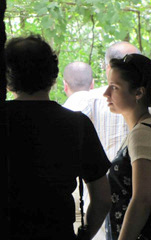
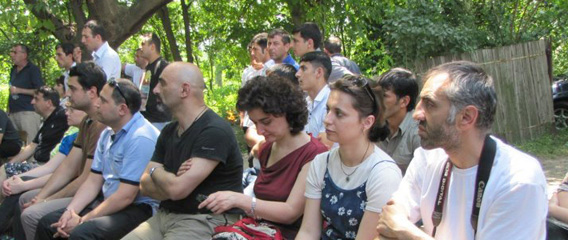
Samvel Israelian: Unfortunately, we have to recognize the fact that our audience here, too, has confirmed: it is hate speech that prevails in our societies. Is it possible to transform such speech? Yes, it is. As our honorable cinematographer said, hate speech can be transformed through culture, through dialogue, through meeting one another. I have an idea, a practical proposal. We know that, in Armenia, Facebook is more or less a free territory, where people of various sections of the population – from nationalists to liberals – express their own ideas freely, without any censorship. By and large, the whole political spectrum of Armenia is represented there. I propose to create a page on Facebook and name it something like “I Am Against War”. It’s my own idea, and the page is under preparation. The only limitations will be: not to express any thoughts that might provoke violence or war; any other ideas and discussions are welcome. I think of involving many people, who weren’t able to come or didn’t know about our today’s meeting. We could also get involved in discussing our today’s issues – that is, whether society could intervene and prevent war, and about its duty to do something in order we had no more exchanges of fire and violations of the ceasefire in the future – an even greatly larger audience. As soon as the page is created, I’ll need your support. As far as possible, I will send invitations to those present here: please sign up and actively participate in our discussions. I am sure our society is able to find if not the solution, at least the right ways to it. As our audience says, we have a common platform; we can’t but have it. Our authorities say our opinions are cardinally different: territorial integrity there, independence here – but I am sure we have a platform to settle the conflict.
Moderator: I thank our speakers for the debate: as the saying goes, truth is born of arguments. Our debate wasn’t hot. It was to be expected because, in principle, we are all like-minders here. But if we still want to find the truth, there is another saying: truth is in wine. And I want to present some wine to all the speakers on behalf of myself, so that they could continue their search.
Georgy Vanian: I am very grateful to the speakers and to the listeners. My special gratitude goes to Teyyub Mirkasymov and Thamar Dvalishvili, who organized this meeting. I ask them to say something now.
Teyyub Mirkasymov: Honestly, I didn’t expect I was to give a speech. It is my first visit to Tekali, and, above all, I want to say I like the village very much. In spite of its very limited resources, it is according a very hospitable welcome to so many people, and I am very glad my organization and I have taken part in arranging such an important event. I believe the discussion was very fruitful, and I’d like to thank all the participants. Thank you!
Tamuna Dvalishvili: Let me too thank all the participants. I, too, believe the day’s work was useful. This is a very symbolic place, and I hope a lot of problems regarding all of us, irrespective of our origin, will be solved here. I am grateful to all the participants: it was very interesting.
Moderator: I thank our speakers for the debate: as the saying goes, truth is born of arguments. Our debate wasn’t hot. It was to be expected because, in principle, we are all like-minders here. But if we still want to find the truth, there is another saying: truth is in wine. And I want to present some wine to all the speakers on behalf of myself, so that they could continue their search.
Georgy Vanian: I am very grateful to the speakers and to the listeners. My special gratitude goes to Teyyub Mirkasymov and Thamar Dvalishvili, who organized this meeting. I ask them to say something now.
Teyyub Mirkasymov: Honestly, I didn’t expect I was to give a speech. It is my first visit to Tekali, and, above all, I want to say I like the village very much. In spite of its very limited resources, it is according a very hospitable welcome to so many people, and I am very glad my organization and I have taken part in arranging such an important event. I believe the discussion was very fruitful, and I’d like to thank all the participants. Thank you!
Tamuna Dvalishvili: Let me too thank all the participants. I, too, believe the day’s work was useful. This is a very symbolic place, and I hope a lot of problems regarding all of us, irrespective of our origin, will be solved here. I am grateful to all the participants: it was very interesting.
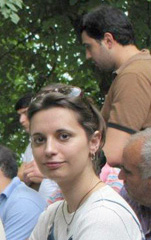

Georgy Vanian: Before we vote, let me say one or two words and define concretely what we are going to put to the vote. Today I will make a proposal, which we are too late with, I would say deadly late. But first I’d like to say: Tekali isn’t a civil society initiative; it is an initiative of people. I see much more people involved with the conflict, from the frontier area, who express their personal opinion here, than those, who consider themselves public figures. Only when we estranged people, become able to engage ourselves in preventing such barbarities, only then, I think, we’ll be able to figure out what civil society is.
To summarize all the concrete proposals, I, too, respond to the call for concrete proposals: I suggest creating a Tekali Group of Monitoring and Urgent Response for the frontline. It will include the citizens involved in the conflict. When I say involved in the conflict, I mean Georgian citizens as well, because they, too, are involved in our conflict, and because the Georgian reforms greatly encourage Armenian and Azerbaijani citizens. Georgia is our hope to come to civilized world, but still – a thousand apologies, it’s my personal opinion – Georgia will remain a hostage of the Armenian-Azerbaijani conflict as long as the conflict exists. We have already Georgian moderation: Mamuka Areshidze was the first to name our movement the Tekali process, and many people call it so today. This small village can set the tone: it can accumulate all good ideas and have an impact on the barbarity, on the war declared to Armenian, Azerbaijani and Georgian citizens. Thus my suggestion is: when you put to the vote whether society can have an impact on the situation with the cease-fire, let it be the vote for establishing the Tekali Urgent Response Group.
The question Violation of cease-fare: is public intervention a realistic idea? is submitted to the vote.
The results are: yes – 58, no – 6.
To summarize all the concrete proposals, I, too, respond to the call for concrete proposals: I suggest creating a Tekali Group of Monitoring and Urgent Response for the frontline. It will include the citizens involved in the conflict. When I say involved in the conflict, I mean Georgian citizens as well, because they, too, are involved in our conflict, and because the Georgian reforms greatly encourage Armenian and Azerbaijani citizens. Georgia is our hope to come to civilized world, but still – a thousand apologies, it’s my personal opinion – Georgia will remain a hostage of the Armenian-Azerbaijani conflict as long as the conflict exists. We have already Georgian moderation: Mamuka Areshidze was the first to name our movement the Tekali process, and many people call it so today. This small village can set the tone: it can accumulate all good ideas and have an impact on the barbarity, on the war declared to Armenian, Azerbaijani and Georgian citizens. Thus my suggestion is: when you put to the vote whether society can have an impact on the situation with the cease-fire, let it be the vote for establishing the Tekali Urgent Response Group.
The question Violation of cease-fare: is public intervention a realistic idea? is submitted to the vote.
The results are: yes – 58, no – 6.

The Welcoming Speech
of the Village Imam:
We Tekali villagers,
welcome you all.
We believe that this
is the place where
many problems
will be resolved.
We want to tell you
that reconciliation
will come and
everything will be
normal because
our land, the land
of Tekali, is very kind,
and very kind people
are living here!
Thank you to everyone!
